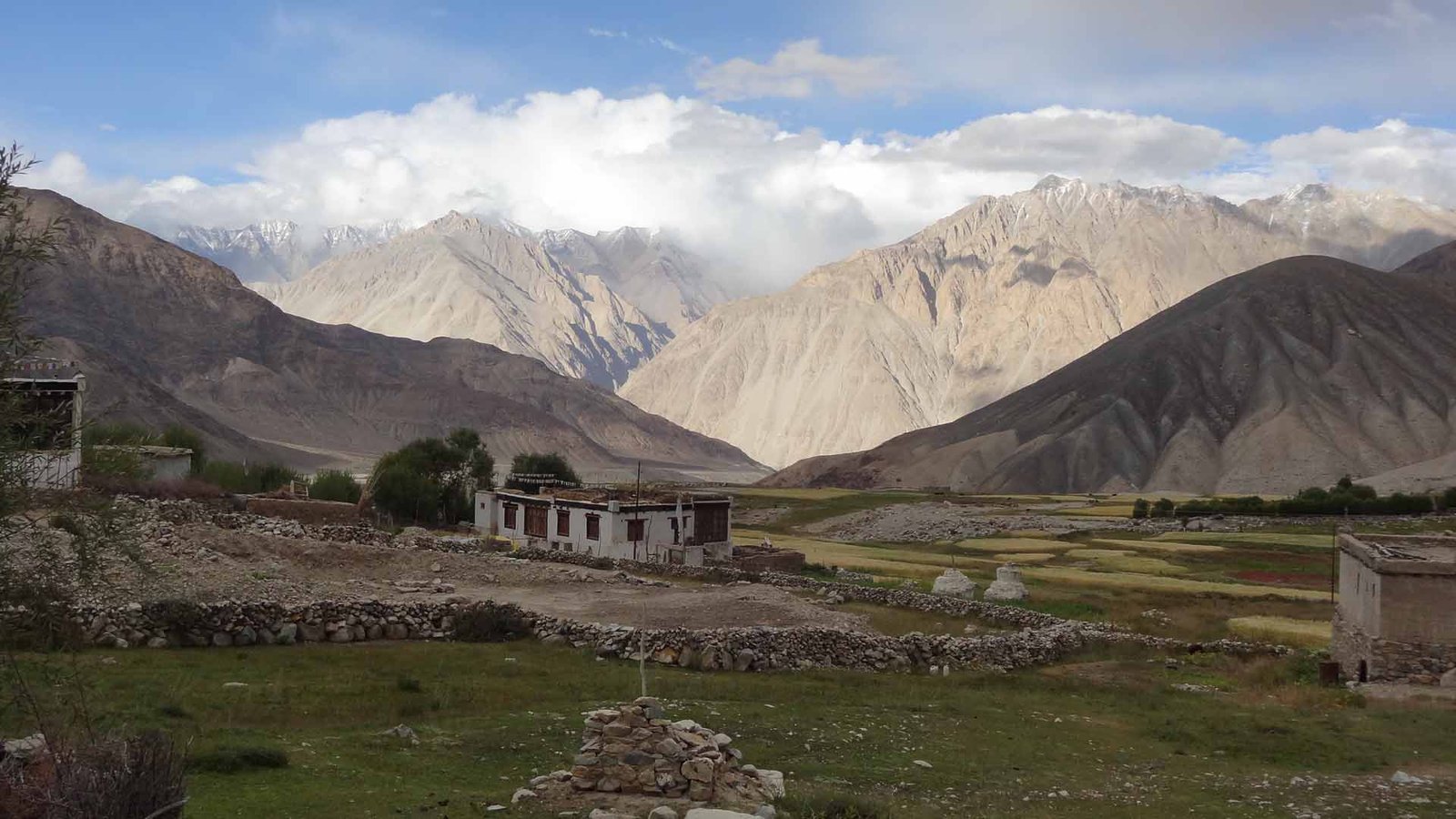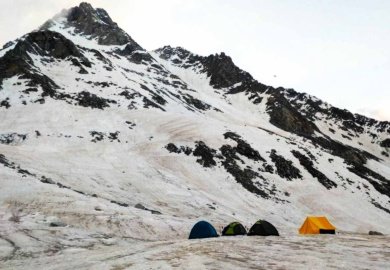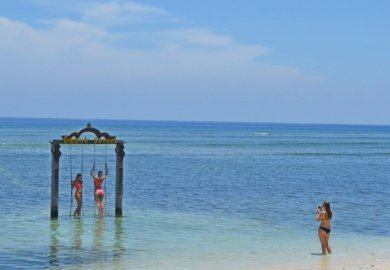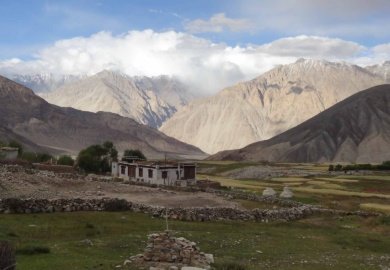A pocket guide to packing out everything including ego.
On the map, the Markha valley looks like a thin thought threading south of Leh, a blue-green ambiguity labeled river, a stipple of villages Skiu, Markha, Hankar, Nimaling and the clean blade of Kongmaru La leaning into sky. On the ground, it is dust and light and the sound of boots negotiating centuries. It is mani walls and prayer flags learned by wind. It is willows that know exactly how hard this country can be and still make shade of it. It is the kind of beauty that can break if you touch it wrong.
I arrived in Hemis country with a backpack that knew my shoulders too well and a pocket-sized notebook labeled Leave No Trace. Someone had drawn a small yak on the cover and written a single sentence beneath: Pack out everything especially the part of you that needs to be seen. That line kept me honest when the trail tried to turn me into a protagonist.
This is not a manual written by a saint. This is a field confession by a person who learned, one switchback at a time, that the most important gear on the Markha Trail is manners.
Card Zero: I Unpack My Ego Before My Tent
The trailhead at Chilling is all bright river and quiet bravado. The Zanskar and Indus have their stern conversation offstage; here, the Markha begins like a careful hello. I met my guide Stanzin, a man who has a handshake like honest rope and a donkey with opinions. We crossed the suspension bridge the color of steel that’s remembered a long winter. The wind did the first inventory: everything secure? are you aware? will you listen?
I pulled out the pocket guide and read Card Zero aloud, as if the river needed to hear it:
Unpack your ego.
You are not here to complete the trail before the weather does. You are not here to win. You are a guest. Walk like one. Speak like one. Leave like one.
The trail accepted this declaration and promptly demanded water.
I drank from a bottle I’d owned long enough to earn a name, filtering from a side stream well away from the main flow. A raven watched me with judge-like interest. My breath learned the altitude by failing once and then adjusting. I kept my eyes down long enough to see the little things the insect highways between stones, bootprints that had the same humility as rain, a tiny sprig of green insisting on life where geology had declined to help.
It is astonishing how loud a person becomes when the landscape is quiet. The first mile, I could hear every ambition rattling in my pack. The second mile, I found the zipper that shut them up.
Card One: Plan Like a River, Not a Rocket
We camped near Skiu, where the Markha loosens and the village grows out of its banks: terraced fields arguing successfully with rock, willows pretending to be clouds. In the evening, the homestay courtyard smelled of smoke and gur-gur cha; children practiced their small sprint of laughter; a grandmother wiped a table with the authority of a cartographer correcting a coastline.
Card One lay like a rule on the table:
Know before you go.
Permits. Weather. Water sources. Cultural codes. Trail closures. Altitude. Pack less than your pride but more than your laziness. Share your itinerary with someone who worries in useful ways.
I learned the valley’s grammar from Rigzin, our host, who poured tea and translated the trail into courtesy.
“No fires,” he said, nodding toward the poplars. “This is cold desert. Wood is house, fence, winter. If you must cook, stove. If you must be warm, clothes and company.” He smiled. “Company is the best fuel.”
“Toilets?” I asked, because adulthood is mostly logistics.
“In village dry toilets. Learn to love them. They feed the fields with time. On the trail if no facility, cat hole far from water, 15–20 cm deep, away from camps and paths. Pack out toilet paper. Better bring WAG bags and pack out everything. In this air, nothing disappears quickly except good intentions.”
The night was a ledger of small sounds: the river making its steady vowel; a donkey complaining to a star; a prayer flag clicking each knot like a rosary. My tent learned the wind. My head learned stillness. My ego slept outside, under the moon, where it could see how small it was, and grin.
Card Two: Feet Where Feet Belong
We woke to the blue that only valleys know. The trail wrinkled beside the river; above, mani walls held their text of stone and touch. Card Two rode in my pocket like a teacher clearing their throat:
Travel and camp on durable surfaces.
Rocks, gravel, dry grasses, snow. Stay on the path, even when it is muddy, even when it is longer, especially when a shortcut looks like intelligence and is actually erosion. Switchbacks are not a suggestion; they are a treaty.
A goat trail ran up a slope where the official path zigzagged. Temptation has a very particular angle. Stanzin tapped the side of his boot and said simply, “We keep the path alive by walking it.” There are sentences you don’t argue with. The slope kept its shape because we kept our word.
At Sara, we crossed the river on flat stones rehearsing composure. I placed each step like a letter in someone else’s alphabet. On the far bank, the trail narrowed under a cliff stippled with pika doorways. A blue sheep bharal wrote itself across the talus with the sighless elegance of animals who do not need Google Maps.
I resisted the urge to leave the path for a better angle, a better picture, a better story. If you give in once, you teach the hillside to fail. I let the photograph be less than perfect so the slope could remain itself. Perfection is a hungry god; I didn’t feed it.
We camped on a patch of gravel already scuffed by tents, the earth proof of prior use. The best campsite is the one that remembers other camps and forgave them. I staked down the tent with care and wondered why I do anything in cities without this attention.
Card Three: Pack In, Pack Out, Pack Down the Pride
By the time Markha village came into view, with its gompa perched like an idea that refused to leave, I had begun to think of my trash not as waste but as a leash attached to me and to everyone who would walk here after me. The pocket guide made it official:
Dispose of waste properly.
Everything you bring in, bring back out: wrappers, fruit peels, tea bags, microtrash, used TP, tampons, wet wipes, broken buckles, ego crumbs. Use homestay toilets; don’t invent your own. Strain dishwater and scatter it away from water sources. Soap is not holy keep it out of streams.
Microtrash is an unglamorous religion. I kept a ziplock labeled TINY SINS in an outer pocket and made a ceremony of feeding it: the foil circle from a blister pack, a noodle of frayed cord, a twist of thread, a stubborn seed of dried food. The bag made the reassuring crackle of penance.
At the river crossings, kids shouted hello and ran along the bunds, experts in balance. One boy pointed at the mesh pocket of my pack and said, “Yeh kachra ka bag?” Your trash bag? When I nodded, he grinned as if we shared a joke about adulthood. I handed him a spare I’d brought. He folded it like a letter and chased his friends, proud for reasons that made sense.
In Hankar, a woman in a felt cap held up an empty biscuit wrapper she had collected from the trail and said, almost sadly, “Someone will come, and we will make tea for them, and they will leave this. Tea is free; we do not charge for it. But wrappers are expensive.” She put the wrapper in her stove to save her field the trouble of digesting plastic. Better would have been for me never to hand her this dilemma. Better, always, is before.
That night, when wind rattled the guy-lines and the Milky Way admitted it has always been a river, I lay in the small cave of my tent and listened to the buzz of something that might have been a mosquito and might have been my conscience. Packing out isn’t hard. Deciding to is the labor.
Card Four: Poop Is Policy
There is, in every long walk, a moment when a person accepts they are mostly water, inconveniently organized. Mine arrived between Hankar and Thachungtse, wind straight from Kongmaru La, landscape sunlit and honest as a grandmother, and me taking inventory of bushes that would not exist until July.
Card Four did not try to be poetic:
Human waste: be deliberate and decent.
Use village dry toilets whenever possible. On the trail, choose catholes 200 feet (70 paces) from water, camp, and trails. Dig 6–8 inches (15–20 cm). Cover and disguise. Pack out toilet paper, wipes, tampons. Better yet carry WAG bags and pack out everything. The desert is slow; do not ask it to hurry for you.
I carried a trowel because dignity is portable, and a WAG bag because some ecosystems demand more leaving than burying. This is the part of leave-no-trace that tests whether the principle is a principle or just a bumper sticker. I can report that humility is shockingly light once you decide to carry it.
Later, when we reached Thachungtse and the wind pretended to be polite, I watched two trekkers wander toward the river with a roll of toilet paper like a white flag. Stanzin gave a quiet whistle and pointed them toward the toilet trenchdug by the camp crew well away from the flow. They nodded, corrected, learned. We are all neighbors to each other’s water.
Card Five: Kitchen Is a Verb
At Nimaling, the meadow widened into a premise: the valley opens its hands, the sky lays down its shield, the mountains stare you into clarity. Sheep dotted the slopes like grammar marks. The wind had the personality of an aunt who loves you enough to scold. We pitched tents on flattened gravel patches, using stones rather than new stakes when soil ran away from definition.
Card Five came out in the cold like a warm truth:
Minimize campfire impacts.
No fires in the cold desert. Stoves for cooking. Layers for warmth. If you must burn, use existing fire pans or rings and dead-and-down wood below treeline where it’s abundant (it isn’t, here). Better don’t. Firewood is a village’s mortgage.
We cooked simple: dal, rice, greens from a kitchen garden at Markha that had been lent to us with kindness and a negotiable price. We used gas, not twigs, for heat. Our dishwater was strained into a corner of gravel away from the khul, that slender irrigation genius. Greywater becomes guesswork if you let it run wild. We chalked a little line on the sand near our washing station: no soap beyond this. Everybody obeyed because the line told the truth: water is a person here.
I cleaned my cup with a thumb of sand and a splash, not because we were short on soap but because we were long on humility. The wind approved by not knocking the pot over.
After dinner, when our headlamps wrote little poems on the stones, Rigzin told us a story about the winter snow leopardtracks that cross Kongmaru like italics and the blue sheep who pretend not to be concerned by punctuation. We listened without asking to see a leopard. Wanting a sighting isn’t a sin. Turning wildlife into content is.
Card Six: Noise Is Litter Too
The next morning the sky had that stainless feel that makes you suspect the day has ironed itself. We climbed toward Kongmaru La, breath doing arithmetic with air. Someone far ahead played music on a phone, epic synths tumbling down the talus like plastic. Card Six flattened itself against my ribs as if to avoid the avalanche:
Respect wildlife and other visitors.
Keep voices low. Observe animals from far. No drones without permission (and rarely, if ever, here). Yield to those climbing; give way to horses and donkeys. Your playlist is not a public service.
I did the only thing I could: I slowed until the music slipped over the ridge and disappeared into its natural habitat the past. In the hush, I heard what the day had been saying all along: wind, crow, river, boot on grit, heart. If you’ve never heard your own heart on a pass, you’ve never really climbed it.
At the cairn, prayer flags snapped in the old dialect of cloth. I tied a ribbon someone had given me in Markha, after I asked if it was appropriate. The older man at the gompa had shrugged: “If you are praying, all places are appropriate. If you are decorating, none are.” I was praying for the valley to still exist when I returned. The knot held. Ego stayed in my pocket because the wind was letting me keep my hat.
We descended past chortens, keeping them to the right, walking clockwise, because manners are also a kind of trail maintenance. We did not sit on mani walls; we did not stand on stupas; we did not make altars into benches. It is amazing how holy a place becomes when you behave as if it already is.
Card Seven: Culture Is Not a Backdrop
Between Skiu and Markha, I asked a woman if I could photograph her headgear felt base, coins stitched in circles, marigolds and barley whiskers composing sunlight. She shook her head kindly and said, “No today. I wear for market; you come then. Or I will bring you tea and we will talk without the lens.”
Card Seven had been waiting for me to be slightly foolish:
Be a guest, not a consumer.
Ask before you photograph people, homes, temples, animals. Do not pose on monuments or prayer walls. Walk clockwise around chortens. Keep drones grounded unless local authorities and villagers agree. Buy tea, not access. Learn julley and mean it. Tip in ways that leave dignity intact.
We sat instead and drank salt tea in her courtyard while goats did their private politics and a child practiced the craft of repetition with a bucket and a staircase. She told me the proverb for the day after rain. I told her the proverb for travelers who put their feet in their mouth. We laughed until the tea forgot to cool.
I learned to carry small, useful things: repair tape, needle, string, extra bags, to fix a strap, mend a shoe, hand a kid a piece of string and become interesting for ten minutes while adults finish a chore. Money is good; time is better when the kettle is on and the field has work. I learned to hire where hiring helped: a guide, a pony, a kitchen boy whose day rate could carry a story back home that wasn’t about me. Spending is a form of mapmaking draw it with care.
Field Notes: The Ego Kit I Packed Out
Some trash is obvious: wrappers, batteries, bottle caps, the last thread of a label. The rest lives under the skin. Markha asked me to carry out:
- The need to summit every conversation.
- The hunger to geotag fragile magic.
- The performative photo where I pretend the valley improved by noticing me.
- The impulse to correct local practice with internet knowledge.
- The speed that makes shortcuts look clever.
- The joke that would have laughed at the wrong thing.
- The habit of taking without buying tea first.
I zipped these into the same bag as the microtrash. It rustled less than I expected. It weighed almost nothing after the first day, the way a truly useless item will.
Small Dialogues with the Trail
At a water turn: Two men lift a plank in the khul, water shoulder-checks into a new channel, the field drinks in a language older than my boots. I watch with my hands behind my back because curiosity without help can be heavy. A boy runs past carrying a willow ring insurance against arguments. The ring fits; the valley snugs its fairness. I learn that justice here looks like water taking turns.
At a homestay doorway: A headgear hangs on a peg. I ask what it means and am told work that remembers God. I do not ask to wear it. That is how it remains meaningful to me.
At a tea stall: A convoy passes, and the shopkeeper remarks, “They are our weather.” He refuses my change for the walnuts he insisted I taste; I insist twice. The second insistence works because, here, generosity is a negotiation, not a performance.
On a ridge at dusk: The wind tells a joke about tourists who become loud at sunsets. We stay quiet not because the wind will be offended but because silence is a view too.
How to Pack for a Trail That Remembers
I won’t do a gear list; there are already too many. This is a manners list, weightless and essential.
- Two bags for trash: one for the obvious, one for the tiny sins.
- A trowel or WAG bags the one you will actually use.
- A head that asks first, and a mouth that can be joyful without being a sermon.
- A stove, not a theory of fires.
- A scarf or shawl for monasteries, doorways, cold.
- A small gift you cannot break a valley with: apricot kernels, repair needles, good tea, time.
- A pace that leaves room for what isn’t you.
- A plan to bring your stories home without stealing anyone else’s.
If you need a final test before you zip the pack: can everything you brought return with you without leaving a bruise? If not, change the thing, not the country.
The Pass That Tells the Truth
Kongmaru La is not cruel; it is accurate. It lifts you into your best honesty and sees what you do with it. I climbed slowly, like someone carrying glass. Breath in fours. Steps in threes. Counting is a kind of prayer for those of us who don’t have the right mantras. The cairn appeared exactly when it meant to, and the valley on the other side widened like an apology I didn’t deserve.
At the top, someone had left a plastic flag tucked under the stones bright, cheap, convinced. I looked at it for a minute, then slid it gently into my pack. Leave No Trace is often not dramatic. It is the quiet removal of something that never should have been a monument.
We descended with the caution of people who have been reminded. The river returned. Chortens kept their counsel. A donkey found something to disagree with and then made peace. The trail unrolled like a sentence that remembered its grammar.
By the time we reached Chuskurmo, my TINY SINS bag was fat with evidence and my pride was thin and well behaved. At the last bridge, I stopped and emptied the valley out of my shoes. Dust made a small brown galaxy. The wind rearranged it kindly.
A Pocket Guide You Can Carry Without Paper
If I had to make the pocket guide smaller if I had to write it on my palm between sunscreen and dust it would be this:
- Begin with thanks. You’re on someone’s trail, drinking someone’s water, under someone’s weather.
- Take the official path. Shortcuts cut more than corners.
- Carry your leavings. All of them. Especially the invisible ones.
- Be quiet often. Silence is habitat.
- Ask before you capture. Photos, stories, moments. Pay with time or tea.
- Sleep where the ground already knows tents. Let uncrushed plants remain so.
- Keep soap and sentiment out of streams. Water needs neither.
- Learn a word and use it right. Julley will get you farther than money if you let it.
- Hire well and tip fairly. Support the hands that make your trip possible.
- Leave the pass cleaner than you found it. Every pocket can hold a little litter and a little humility.
Coming Down, Bringing Back
We returned to Leh in the sensible chaos of arrival: boots laced wrong, faces learned by wind, pockets rattling with wrappers that made me proud and ashamed in equal measure. I took my trash to a bin I had sought out backstage from a café a bin that looked like it was used to the idea of being neglected. I fed it and thanked it like you thank a mule that hauled your groceries uphill.
A boy asked where I’d been. “Markha,” I said, and he nodded like I’d just given the correct answer in school. “Leave anything?” he asked, and I realized that was the final exam.
“Footprints in places that could bear them, money in places that needed it, and the rest I brought back,” I said. “Even the big mouth.”
He laughed and carried on, and I carried the trail into the evening like a whispered dare to behave better.
That night, in my room where the city practiced its softer weather, I opened the pocket notebook and added one last card, written in the half-light between sleep and intention:
Card Eight: Tell the Story Without Taking It.
Share the trail in a way that protects it. Don’t geotag fragile places. Give credit to guides, homestays, donkeys, kitchens, the weather. Your best photograph is the habit you carried home.
I taped the card inside the cover, next to the little yak.
Epilogue: What I Failed to Leave Behind
A week later, back where crosswalks pretend to be rivers and coffee does not know the word salt, I unrolled my sleeping bag to air it out. Markha dust tumbled onto the floor fine as a lie, honest as a map. For a second, I almost brushed it into the bin. Then I stopped. I took a jar from the shelf the one labeled Lessons and put the dust inside.
I didn’t want a souvenir. I wanted a reminder that everything I do sheds something. The question is always where it lands.
On the desk, the pocket guide sat open to Card Zero. I underlined pack out everything including ego and added, softly, every time. Not just on trails but on sidewalks, in meetings, in kitchens, at borders, on buses, in rooms where someone else’s patience is the oxygen. Leave no trace is not a wilderness ethic; it is a way to touch the world so it keeps wanting to touch you back.
I laced my boots for a city walk, the kind where you can practice switchbacks by choosing longer, kinder routes and practice packing out by picking up the gum wrappers you didn’t drop. At the door, I felt in my pocket for the TINY SINS bag. Still there. Still noisy with correction. I smiled.
The morning wind, urban and busy, tried to tell me it had nothing to learn from mountain air. I let it pass, and it came back thinner, curious. I stepped out like a guest, even though the street had my address. Somewhere under a high sun, the Markha went about its patient work. I could almost hear the flags at Kongmaru La arguing their brightness into the day, could almost smell tea in a courtyard where goats behave like punctuation.
When the city asked what did you bring, I said: less. And the city brave, loud said it would try it too





